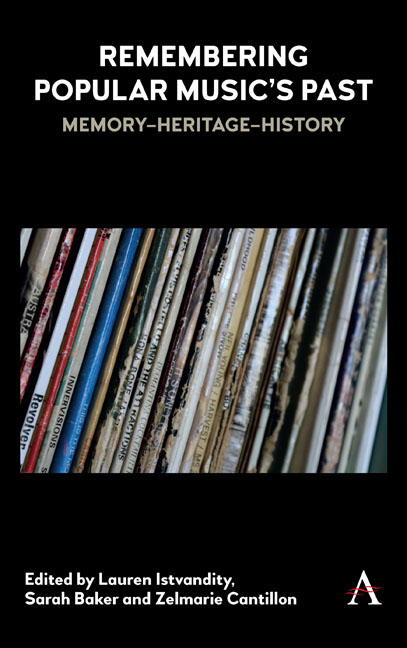Book contents
- Frontmatter
- Contents
- List of Figures
- Acknowledgements
- Chapter 1 The Precarity of Memory, Heritage and History in Remembering Popular Music's Past
- Part I MEMORY
- Part II HERITAGE
- Chapter 7 Mark II: Reworking the Heritage B(r)and
- Chapter 8 The Continually Precarious State of the Musical Object
- Chapter 9 Showing Off: Taking Popular Music Research into the Museum
- Chapter 10 Preserving Icelandic Popular Music Heritage: Issues of Collection, Access and Representation
- Chapter 11 Questioning the Future of Popular Music Heritage in the Age of Platform Capitalism
- Part III HISTORY
- List of Contributors
- Index
Chapter 7 - Mark II: Reworking the Heritage B(r)and
from Part II - HERITAGE
Published online by Cambridge University Press: 09 July 2019
- Frontmatter
- Contents
- List of Figures
- Acknowledgements
- Chapter 1 The Precarity of Memory, Heritage and History in Remembering Popular Music's Past
- Part I MEMORY
- Part II HERITAGE
- Chapter 7 Mark II: Reworking the Heritage B(r)and
- Chapter 8 The Continually Precarious State of the Musical Object
- Chapter 9 Showing Off: Taking Popular Music Research into the Museum
- Chapter 10 Preserving Icelandic Popular Music Heritage: Issues of Collection, Access and Representation
- Chapter 11 Questioning the Future of Popular Music Heritage in the Age of Platform Capitalism
- Part III HISTORY
- List of Contributors
- Index
Summary
And why ‘heritage’ as opposed to ‘culture’? They are still alive and performing after all. (Les Roberts on The Who, 2014, 263)
Les Roberts's observations of The Who –a band with only its lead singer and guitarist/ songwriter alive of its founding members –raises an interesting question about meanings of heritage in popular music, and within popular culture more broadly. To engage the backroom and on-the-road machinery to tour, to perform the back catalogue (and newer works) nightly, is to insist on presence and meaning in contemporary popular music. As Roberts (2014, 263) points out, The Who must also contend with other imaginings; their closing of the 2012 Olympic Games in London fixed them as ‘heritage’, where the live and televisual audience were invited to consume both the live performance and their status as the ‘Best of British’ rock in other times.
In a very different context, Simon Leys's (2006) novella, The Death of Napoleon, asks similar questions about perceptions of heritage in contemporary eras. It is the late 1800s. Itching to escape British-imposed exile on St Helena, Napoleon boards a Portuguese seal-hunting ship, leaving a loyal former officer to act as his double as he once again seeks to rule France. Making it to Brussels, the former Emperor grabs the first opportunity he sees to enter France –a Waterloo history tour, with visits to ‘Napoleon's bedroom’, ‘the battlefield’ and ‘veterans’ providing commentary. With thoughts of a triumphant retake of Paris, plans go awry upon news that the double on St Helena has inconveniently died. The Emperor is immediately confronted with how to manage his present amid a population grieving for his past: ‘from now on, his destiny was posthumous’ (Leys 2006, 69).
The novella is a wonderful conceit that works in multiple ways: the officer performing the daily tribute performance of Napoleon on St Helena; the Emperor confronted with his failures as commodified heritage; and seeking in vain the forms of ‘Napoleon-ness’ which render him once again as authentic. Yet the novella also has something to say more broadly about nostalgia and time. The busy, portentous present is compared with the inaction of the past.
- Type
- Chapter
- Information
- Remembering Popular Music's PastMemory-Heritage-History, pp. 85 - 100Publisher: Anthem PressPrint publication year: 2019



